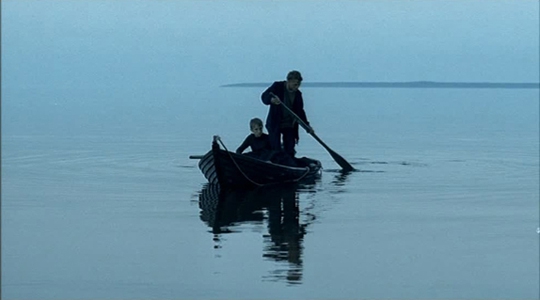The Return: Movie Review
08/22/2005
“The Return” marks the debut of Andrei Zvyaginstev, a Russian film maker who has already been compared by many to his legendary countryman, Andrei Tarkovsky (“Solaris”). It is easy to see why, as Zvyaginestv’s award winning first film has the measured, languid feel reminiscent of Tarkovky’s “Stalker”, combining stunning visuals with a bare bones plot that belies its true emotional and thematic complexity. Rich with symbolism and meticulous design that, for the most part take the place of dialogue, the film works both as a haunting, almost mythic piece of art house cinema and as a gripping thriller which skilfully keeps the viewer in suspense.
The plot follows two young boys, Andrei and Ivan who live in a remote area of Russia with their mother. One day, they return home to be greeted with news that their absentee father, who they know only from an old photograph, is sleeping in the bedroom. The next morning, the father takes the boys on a cross country journey to a remote island in what seems to be a series of tests of their manhood, as well as serving his own, unspoken purpose. Tensions grow as Ivan, the younger of the two brothers, refuse to accept that the silent, often violent man is really their father, whilst Andrei is only too happy to follow unquestioningly. Eventually, in the middle of the harsh wilderness, disaster strikes, with devastating consequences.
The plot of “The Return” is, on the surface, fairly simple. Zvyaginstev, who also co-wrote the script, makes it plain that there is far more going on beyond the simple mystery of the father’s sudden appearance. The writer/director does this very cleverly and without any kind of exposition or cheap revelations. The viewer is given only cryptic visual hints as to the background of the story and characters, though this fits in with the feel of the film perfectly rather than seeming wilfully obscure. Despite this, and its often dreamlike nature, the film has a clear sense of its own logic and as such is wholly convincing and believable, making it far more grounded and realistic than a simple allegory or fable.
“The Return” is, for large stretches, free of dialogue, and Zvyaginstev gradually fleshes out the characters through their actions and subtle nuances. In the case of the two boys, this is more obvious, since the film is clearly seen through their eyes. The unnamed father, however, remains an enigmatic figure throughout, and it is only towards the end that the viewer, like the boys, is given glimpses of any kind of emotional vulnerability beyond the father’s authoritative manner.
This approach works well to generate tension as to the father’s motivations, as like the boys, the viewer is given no obvious reason for either the father’s absence or his return, and can therefore only speculate along with the boys as to whether the father is some kind of psychotic gangster, or indeed their father at all. As the suspicions of the boys mount, spurred on by their father’s at times inexplicable and threatening behaviour, the viewer is irresistibly drawn into their imaginative plotting, and through this, the director explores both the fear of abandonment and the raw, uncomfortable journey into adulthood in an astute, sophisticated manner.
Perhaps the greatest proof of Zvyaginstev’s skill and achievement is that “The Return” is surprisingly moving despite its initial apparent aloofness. The emotional impact of the last part of the film is considerable, and is made all the more so by its unexpectedness. This shows a talent and confidence all too rare in modern cinema — the ability to allow the viewer to become gradually and quietly involved with the characters without resorting to emotional cliché or the trashy tugging of heartstrings.
Visually, the film is stunning, and Zvyaginstev employs a bleak, washed out look that gives the wilderness an eerie, almost surreal feel. He shoots the film in a calm, unhurried fashion, with long, lingering takes of the landscape. As a result, the film is very atmospheric, and the viewer truly feels transported to this cold region where nothing is certain. For the vast majority of the film, there are only the three main characters on screen, and as well as increasing the uncomfortable sense of isolation, this gives the proceedings a timeless, almost ancient feel.
This feeling pervades the whole film, and makes “The Return” a captivating, fascinating experience. Filled with powerful imagery and an understated yet profound psychological depth, it serves not only to draw attention to the emergence of an extremely talented director, but as a superior piece of cinema in its own right.
James Mudge
www.beyondhollywood.com
